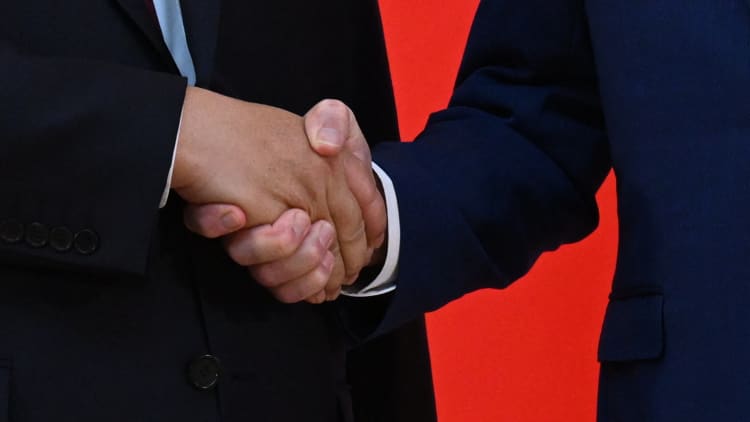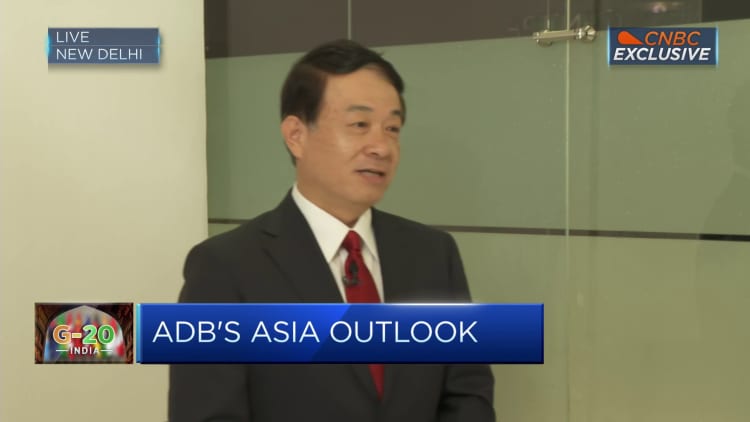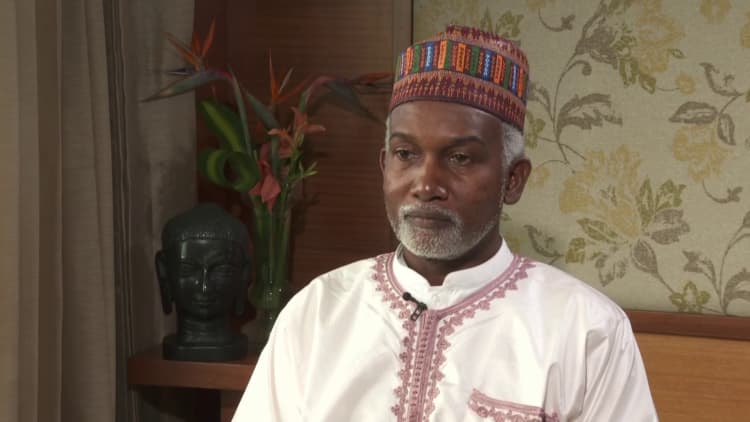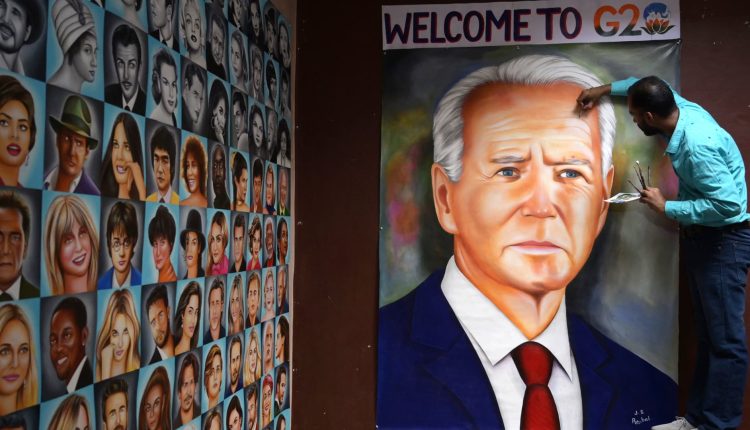Modi, Biden pledge to deepen India-U.S. partnership as world leaders descend on Delhi for G20 summit
Indian artist Jagjot Singh Rubal gives final touches to an oil painting of U.S. President Joe Biden, at his workshop in Amritsar on September 5, 2023, ahead of the two-day G20 summit in New Delhi.
Narinder Nanu | Afp | Getty Images
NEW DELHI — Indian Prime Minister Narendra Modi and U.S. President Joe Biden pledged Friday to deepen the partnership between their countries in their second bilateral meeting in less than six months, as Delhi prepares to host a meeting among leaders of the Group of 20 leading industrialized and developing countries.
The two leaders met shortly at Modi’s official residence after Biden’s arrival in Delhi and then issued a 29-point statement that highlighted the depth and breath of their relationship at a time of evolving global alliances — from building resilient strategic technology value chains and linking defense industrial ecosystems, to collaborating on renewable and nuclear energy, climate financing and cancer research.
The two leaders “reaffirmed the importance of the Quad in supporting a free, open, inclusive, and resilient Indo-Pacific” and “expressed their appreciation for the substantial progress underway to implement the ground breaking achievements of Prime Minister Modi’s historic June 2023 visit to Washington.” The Quad is an informal security alignment of Australia, India, Japan and the U.S., which came about in response to China’s rising strength in the Indo-Pacific region.
This closed-door meeting with Biden was the third — after meetings with leaders from Mauritius and Bangladesh — that Modi convened on the eve of the G20 leaders’ summit and part of the dozen or so bilateral meetings planned for this weekend, underscoring India’s strategic ambitions as a key global player connecting the developed world and the Global South.
The summit is an important one for Modi, whose government has turned the normally sedate rotating G20 presidency into a branding vehicle to burnish India’s geopolitical importance ahead of national elections next year. Many governments, investors and businesses are also starting to look toward India — as China slows — which the International Monetary Fund expects to be the fastest growing economy this year.
Weekend consensus
This weekend’s agenda includes the expected admission of the African Union as an official G20 member as part of India’s broad focus on elevating the place of the Global South and fostering inclusive and sustainable growth in the multilateral forum founded in 1999 as a platform to address issues afflicting the global economy.
Russian President Vladimir Putin and China President Xi Jinping though won’t be in attendance this weekend.
While Putin is sending Foreign Minister Sergey Lavrov to take his place, China Premier Li Qiang will take Xi’s place — the first time Xi is skipping the G20 meeting in the decade since he became president.

Putin has not traveled outside of Russia since the International Criminal Court issued a warrant for his arrest for war crimes in Ukraine.
The pair’s absence has sparked fears that a communique binding member states may not be issued at the end of a G20 leaders’ summit — undercutting India’s clout and diminishing his domestic messaging.
India’s diplomats have been unable to foster binding agreements in the key discussion tracks since it assumed the rotating presidency in December 2022 — because Russia and China have objected to the wording referring to the war in Ukraine.
A war of words has ensued ahead of this weekend’s meeting.
“The G7 countries (primarily the US, the UK, Germany, and France) have been exerting pressure on India in a bid to have their unilateral approaches to the Ukraine situation reflected in the final documents of G20 forums,” the Russian foreign ministry said in a statement.
At a pre-summit press conference Friday, India’s G20 sherpa Amitabh Kant said the final declaration “is almost ready.”
“I can assure you our presidency has been inclusive, decisive and action-oriented,” Kant said.
Alternative to China
With Putin and Xi conspicuously absent this weekend, India and the U.S. will hope this will be sufficient to persuade member states and other observers from the Global South they represent a more viable proposition from food security to debt resolution.
In their joint statement after their Friday bilateral meeting, Biden and Modi “reaffirmed their commitment to the G20.”
They also “expressed confidence that the outcomes of the G20 Leaders’ Summit in New Delhi will advance the shared goals of accelerating sustainable development, bolstering multilateral cooperation, and building global consensus around inclusive economic policies to address our greatest common challenges, including fundamentally reshaping and scaling up multilateral development banks.”

While Putin has an obvious reason accounting for his absence, Xi, though, has not indicated a reason — triggering speculation the Chinese leader may be snubbing Modi for a variety of reasons.
Despite recently traveling to South Africa for a BRICS meeting, Xi has rarely traveled abroad. Instead, he has tended to receive visiting dignitaries in Beijing — including Zambia and Venezuela in overlapping visits this weekend.
India’s warming ties with the U.S. also sharply contrasts against its standoff with its neighbor, China.
India — along with Malaysia, the Philippines, Vietnam and Taiwan — sharply rebuked China last week for a new national map that Beijing claims contested territories as its own.
India also stands to gain from American companies looking to diversify their supply chains — at China’s expense — as the U.S. ramps up efforts to limit the transfers of strategic technology to China on the grounds of national security.
This would likely be what Modi and Biden conceived as “their ambitious vision for an enduring India-U.S. partnership that advances the aspirations of our people for a bright and prosperous future, serves the global good, and contributes to a free, open, inclusive, and resilient Indo-Pacific.”

Read the full article here

